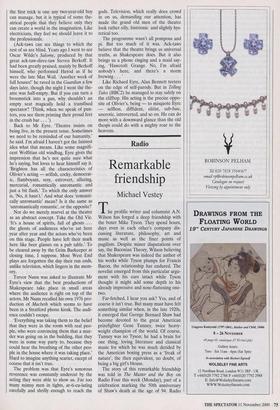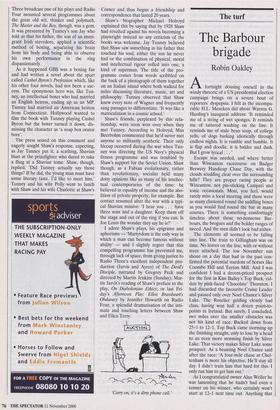Radio
Remarkable friendship
Michael Vestey
The prolific writer and columnist A.N. Wilson has forged a deep friendship with the boxer Mike Tyson. They spend hours, days even in each other's company dis- cussing literature, philosophy, art and music as well as the finer points of pugilism. Despite minor disputations over say, the Baconian Theory, Wilson believing that Shakespeare was indeed the author of his works while Tyson plumps for Francis Bacon, the relationship has endured. The novelist emerged from this particular argu- ment with his ears intact while Tyson thought it might add some depth to his already impressive and nose-flattening one- two.
Far-fetched, I hear you ask? Yes, and of course it isn't true. But many must have felt something similar when, in the late 1920s, it emerged that George Bernard Shaw had become devoted to the great American prizefighter Gene Tunney, twice heavy- weight champion of the world. Of course, Tunney was no Tyson; he had a brain for one thing, loving literature and classical music for which he was much derided by the American boxing press as a 'freak of nature', the then equivalent, no doubt, of being a big girl's blouse.
The story of this remarkable friendship was told in The Master and the Boy on Radio Four this week (Monday), part of a celebration marking the 50th anniversary of Shaw's death at the age of 94. Radio Three broadcast one of his plays and Radio Four mounted several programmes about the great old wit, thinker and polymath. The Master and the Boy, though, was a gem. It was presented by Tunney's son Jay who told us that his father, the son of an immi- grant Irish stevedore, applied a scientific method of boxing, separating his brain from his body and being able to observe his own performance in the ring dispassionately.
As it happened GBS was a boxing fan and had written a novel about the sport called Cashel Byron's Profession which, like his other four novels, had not been a suc- cess. The eponymous hero was, like Tun- ney, an intellectual boxer who had married an English heiress, ending up as an MP. Tunney had married an American heiress from Connecticut. Hollywood wanted to film the book with Tunney playing Cashel Byron but the boxer turned it down, dis- missing the character as 'a soap box orator bore'.
The press seized on this comment and eagerly sought Shaw's response, expecting, as Jay Tunney put it, a scathing, Shavian blast at the prizefighter who dared to take a fling at a Shavian tome. Shaw, though, replied, Did Tunney actually say those things? If he did, the young man must have some literary taste. I'd like to meet him.' Tunney and his wife Polly went to lunch with Shaw and his wife Charlotte at Shaw's Corner and thus began a friendship and correspondence that lasted 20 years.
Shaw's biographer Michael Holroyd explained this by saying that by 1928 Shaw had revolted against his novels becoming a playwright instead so any criticism of the books was welcome. Jay Tunney believed that Shaw saw something in his father that touched his soul, either the son he never had or the combination of physical, moral and intellectual rigour rolled into one, a kind of superman. The title of the pro- gramme comes from words scribbled on the back of a photograph of them together on an Italian island where both walked for miles discussing literature, music, art and philosophy. Tunney observed that Shaw knew every note of Wagner and frequently sang passages to differentiate. 'It was like a matriculation in a cosmic school.'
Shaw's friends, perplexed by this rela- tionship, were soon won over when they met Tunney. According to Holroyd, Max Beerbohm commented that he'd never met anyone so militantly aesthetic. Their only hiccup occurred during the war when Tun- ney was directing the US Navy's physical fitness programme and was troubled by Shaw's support for the Soviet Union. Shaw though, as a Fabian evolutionary, rather than revolutionary, socialist held many dotty opinions like so many of his intellec- tual contemporaries of the time; he believed in equality of income and the abo- lition of private property, for example. But contact resumed after the war with a typi- cal Shavian missive: 'I hear you . . . have three sons and a daughter. Keep them off the stage and out of the ring if you can. Is Joe Louis the wonder they say he is?'
I adore Shaw's plays, his epigrams and aphorisms — 'Martyrdom is the only way in which a man can become famous without ability' — and I slightly regret that this compelling programme has prevented me, through lack of space, from giving justice to Radio Three's excellent independent pro- duction (Jarvis and Ayres) of The Devil's Disciple, narrated by Gregory Peck and directed by Martin Jenkins (Sunday); Mar- tin Jarvis's reading of Shaw's preface to the play, On Diabolonian Ethics; or last Fri- day's Afternoon Play: Ellen Brassheart's Obduracy by Jennifer Howarth on Radio Four, a splendid dramatisation of the inti- mate and touching letters between Shaw and Ellen Terry.
`Carry on, its a dirty phone call.'



























































































 Previous page
Previous page